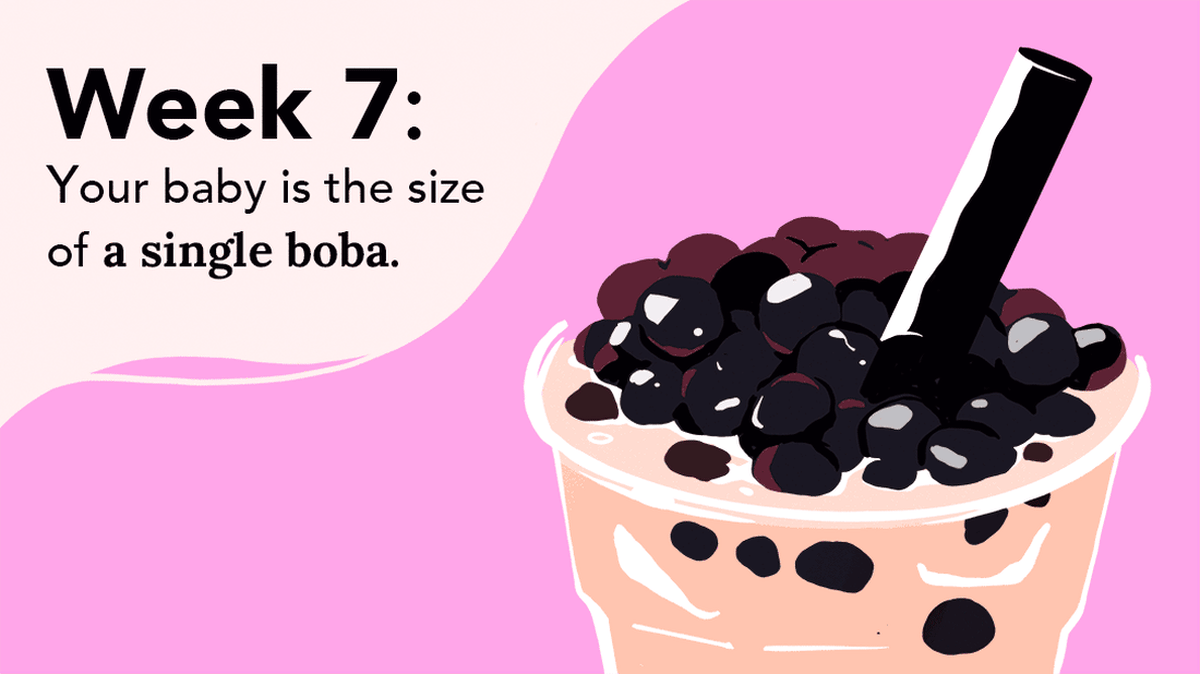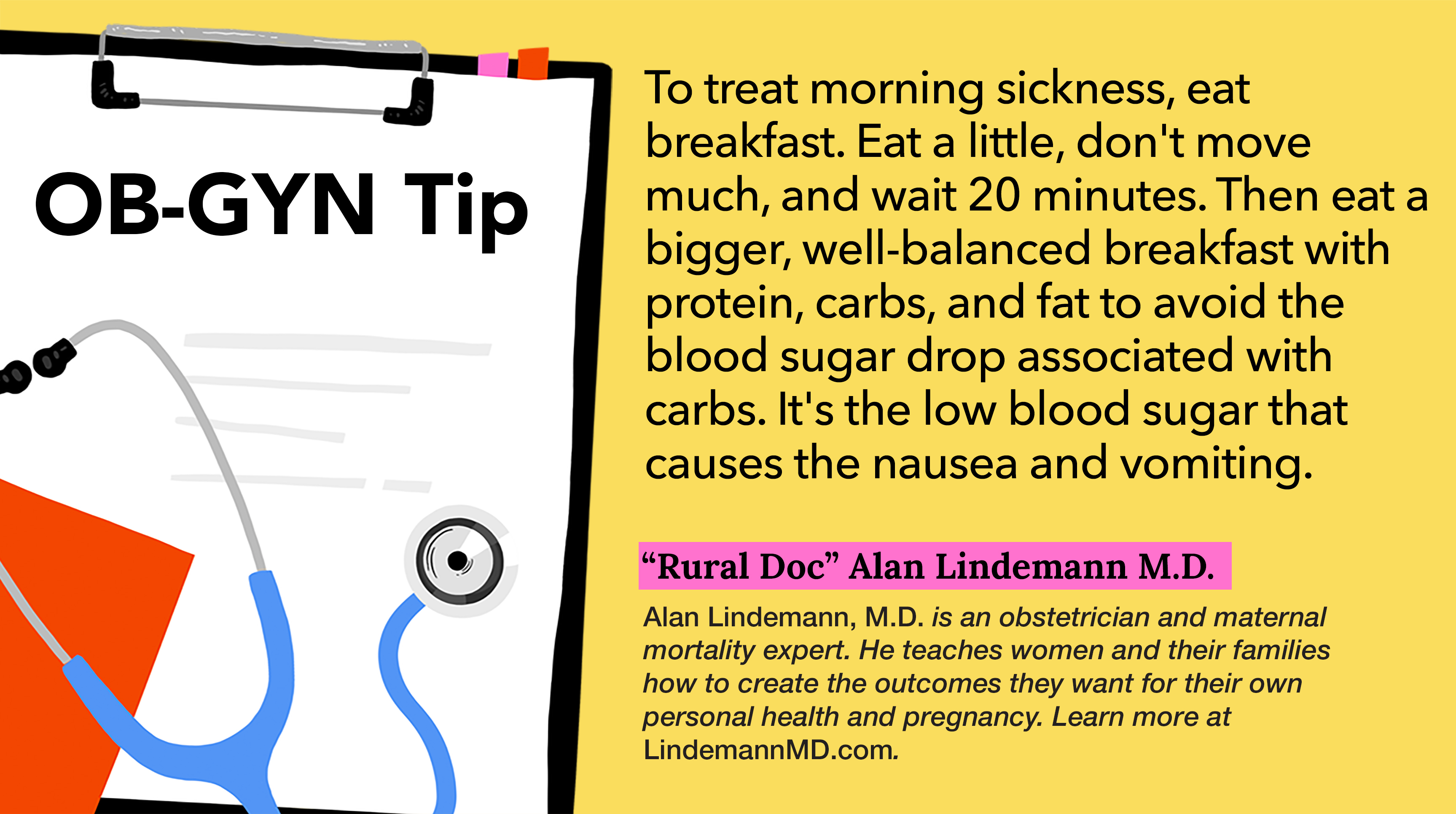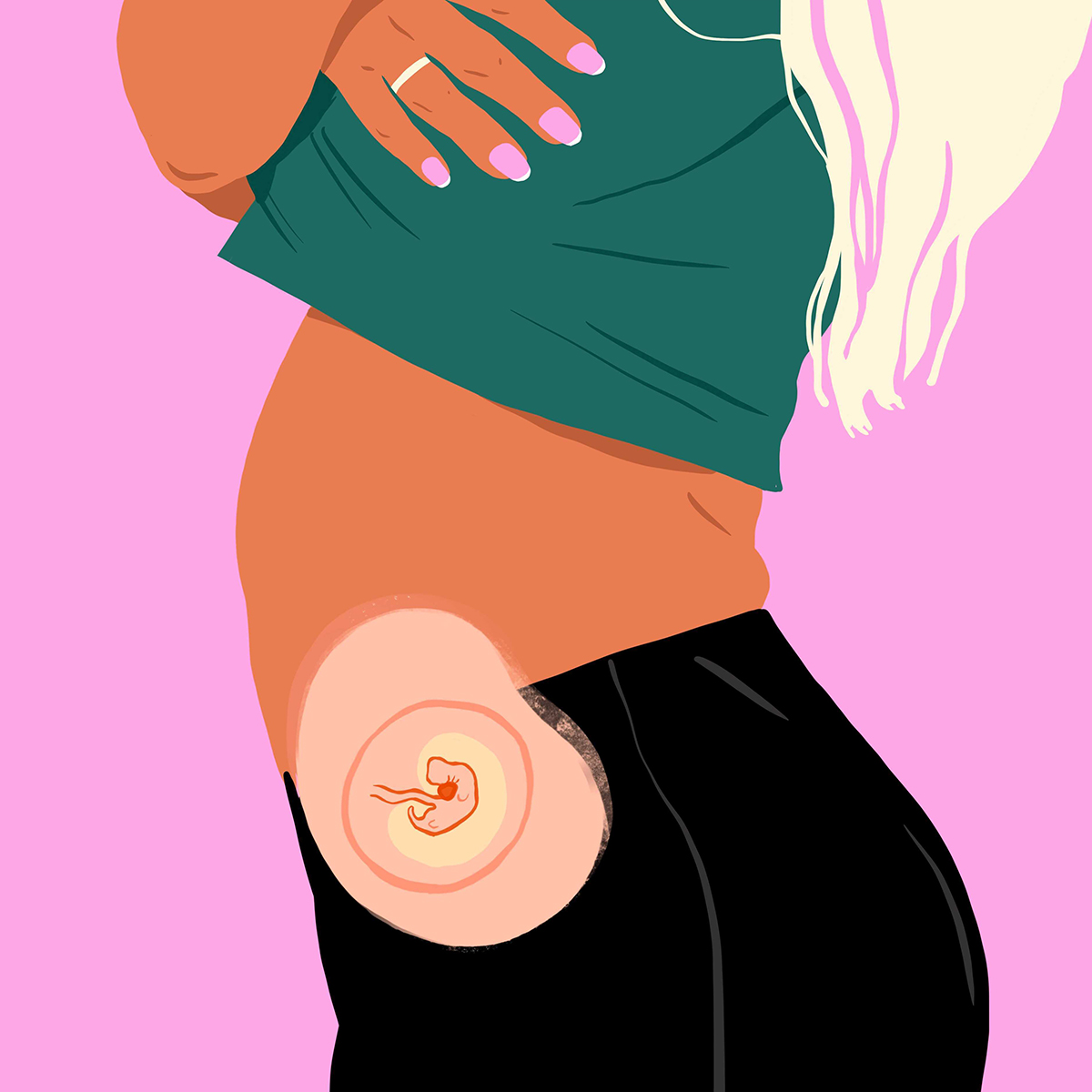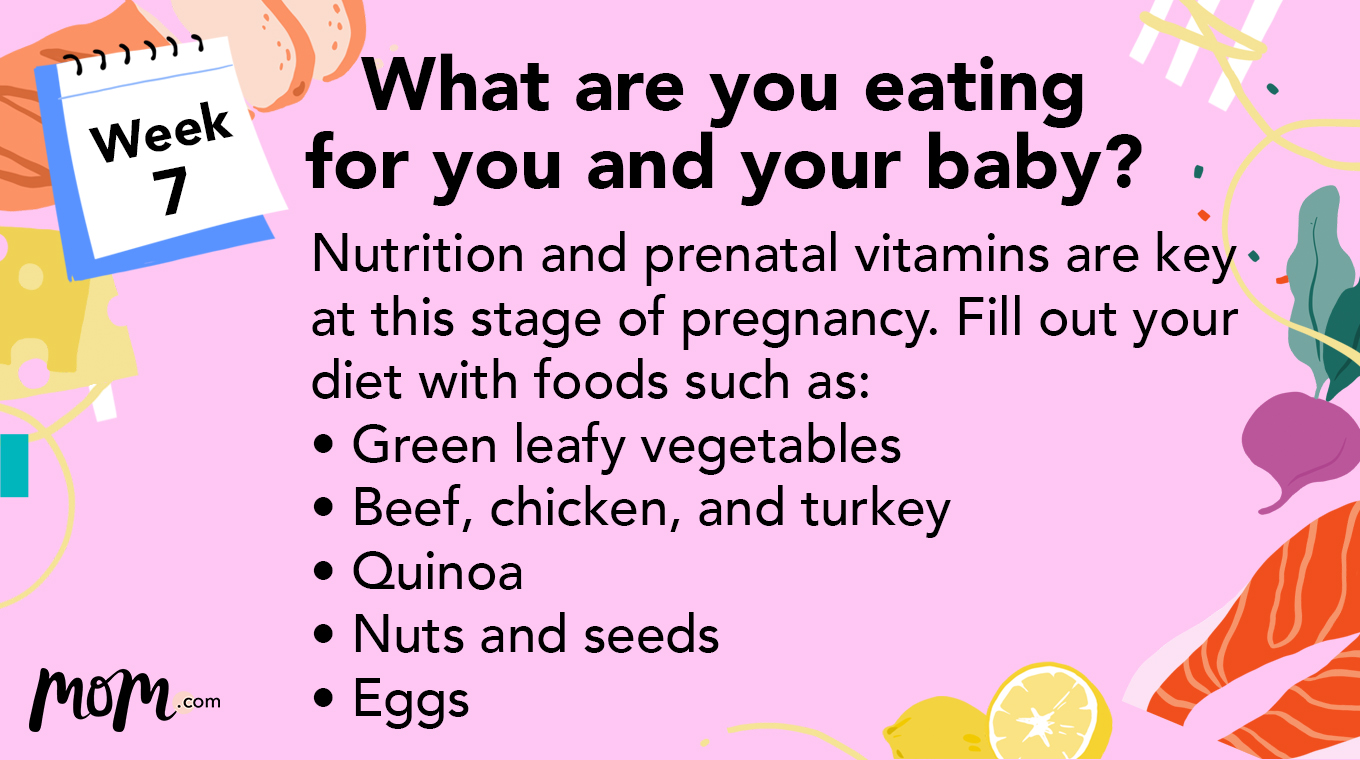
In this article
You’re 7 weeks pregnant!
You're officially 2 months pregnant now and the size of baby at 7 weeks is that of a boba ball. Every pregnancy is different, and at 7 weeks pregnant you may have no symptoms or several. Nausea, vomiting, and morning sickness tend to peak between the 7th and 9th week. It will generally taper off at the end of the first trimester. You may also notice yourself running to the restroom to urinate more often as your body produces more of the hormones progesterone and human chorionic gonadotropin (HCG).

Pregnancy symptoms at 7 weeks
One of the most common 7 week pregnancy symptoms is that your breasts may appear fuller. You'll likely feel heavy and bloated and clothes may start to feel a bit snug at this point. You'll also notice that you may be feeling more tired than usual at 7 weeks.
Breast size increases
At around 7 weeks, your breasts will begin to grow as blood volume increases and your body prepares for nursing. The skin on your breasts may start to feel itchy and uncomfortable along with this growth, and you may notice stretch marks developing. The bumps on the skin of the areola — which commonly darkens a bit during pregnancy — become more pronounced. Called Montgomery's tubercles, they provide essential lubrication to your nipples, an important function to help make breastfeeding easier. Your breasts and nipples may also feel sore and tender to the touch.
Extreme fatigue
The first trimester often brings with it overwhelming feelings of exhaustion and fatigue. You may find yourself wanting to take naps throughout the day. This is completely normal. Progesterone increases significantly during the first few months of pregnancy which can make you feel tired. "Low iron levels can sometimes make you tired as well, although this is more common in later pregnancy," according to the University of Rochester Medical Center. So this is something for you and your doctor to keep an eye on, especially if you have a history of anemia.
Nausea and Vomiting
Hyperemesis gravidarum, or morning sickness, is often common at this stage of pregnancy. Again, this is a result of hormone levels increasing and symptoms usually tend to taper off in the second trimester.
Aversion to certain foods
Another common 7-week pregnancy symptom that typically occurs throughout the first trimester is an aversion to foods or smells. This may occur in conjunction with morning sickness and is thought to be the result of fluctuating HCG levels.
Lower back pain or cramps
Week 7 pregnancy cramping may be felt as a result of your body releasing prostaglandins. This can cause cramping and contractions as well as back pain.
What does 7 weeks equal in months?
Your due date is calculated based on the first day of your last period, 7 weeks pregnant means that you are approximately 2 months along. You're also in your first trimester and will be until about 13 weeks along.
Your ultrasound
At 7 weeks, your first trimester of pregnancy, you've likely not yet had an ultrasound. Early ultrasounds — those done before 13 weeks — may be scheduled for women with certain health conditions. Spotting and bleeding at 7 weeks pregnant may cause your doctor to schedule an early ultrasound at this stage of pregnancy. Your doctor may be checking for conditions like placenta previa or ectopic pregnancy. An early ultrasound, however, can also be ordered for less alarming reasons like confirming the baby's gestational age. Ultrasounds use a device called a transducer to send and receive sound waves from your skin and tissues that create images of your organs.
There are two types of ultrasounds: the pelvic and the transvaginal. The pelvic ultrasound is the one people most commonly think of where the transducer is placed on top of the belly. The transvaginal ultrasound uses a thin transducer placed inside the vagina. Often, a transvaginal ultrasound is done this early on in the pregnancy rather than a pelvic — unless the transvaginal ultrasound would exacerbate bleeding at 7 weeks pregnant for those with certain conditions such as placenta previa.
Your pregnant belly at 7 weeks

Your blueberry-sized baby's vital organs are growing, but for a fetus 7 weeks along, most development is relegated to the head and brain. The final stages of kidney development occur at this stage as well. In the latter weeks of pregnancy, your baby will begin to produce urine which will start to make part of the protective amniotic fluid that has mostly come from water within your own body.
You may be experiencing itching and discomfort as your 7 week pregnancy belly continues to stretch, and fitting into regular pants beyond leggings may prove challenging. If you're not quite ready for maternity pants, consider a handy button extender gadget that attaches to one end of your jean's top button and loops through the corresponding buttonhole. This will buy you a little time as you wait for your maternity pants to arrive. Another fun and loose-fitting option would be to make a fashion statement with a pair of comfy overalls. This may also be a fun time to begin chronicling your pictures, starting with 7 week belly pictures.
Pregnancy tips at 7 weeks
Food cravings
Craving certain foods is common at this point in pregnancy. If you're having healthy cravings, like bananas or broccoli, feel free to indulge in those to your heart's content. Should you be craving candy and junk food, eat those sparingly and try to substitute healthier options when possible.
Morning sickness
This is also a common time for morning sickness to kick in. Consider ginger-based candies and chews to help ease nausea and try to eat smaller meals more often throughout the day to ensure you're able to keep foods down.
Put your feet up
Rest when you can if you're feeling tired. You're growing a human, so it's natural to feel exhausted and sleepy. Some women notice they're also more forgetful at this stage of pregnancy. If there are things you need to remember, write them down and don't feel guilty about feeling 'flighty,' pregnancy brain is common and totally normal.
Your pregnancy checklist at 7 weeks
This week, you can start preparing your body for pregnancy by doing the following:
- If you haven't already, talk with your doctor about any prenatal tests you may need based on your background and ethnicity.
- Begin researching birth plans. There are several options when it comes to giving birth' whether in the hospital with your OBGYN or at a birthing center or at home with a doula and midwife. Whichever option you choose, create a birth plan in advance that covers your wishes as it pertains to all aspects of delivery and birth.
What are you eating for you and your baby?

Your baby's face and physical features are starting to grow at 7 weeks. Brain development is in full effect so nutrition and prenatal vitamins are key at this stage of pregnancy. What you eat will help your baby's body systems develop and grow. Be sure to have your iron levels checked as well and increase iron-intake if necessary. You can obtain much of the vitamins and nutrients needed from your diet but supplements can also be helpful. Fill out your diet with foods such as:
- Green leafy vegetables
- Beef, chicken, and turkey
- Quinoa
- Nuts and seeds
- Eggs
When to call your doctor
Spotting can often be a normal part of early pregnancy but any bleeding or cramps that are more painful than normal menstrual cramps should warrant a call to your doctor. If you're having difficulty keeping food down as a result of severe morning sickness, you'll also want to reach out to your doctor's office to ensure both you and your baby are getting the nutrients you need. The following issues warrant a call to your doctor:
- Spotting or bleeding at 7 weeks pregnant
- Inability to keep foods down
- Weight loss
- Painful cramping
Pregnant women are at a higher risk of illness as a result of a COVID-19 diagnosis and those diagnosed with COVID-19 have an increased chance of delivering pre-term (before 37 weeks), according to the Centers for Disease Control and Prevention (CDC).
Note: If you are visiting your doctor during COVID, be sure to confirm that the doctor's office is following COVID protocols as indicated by the CDC.






